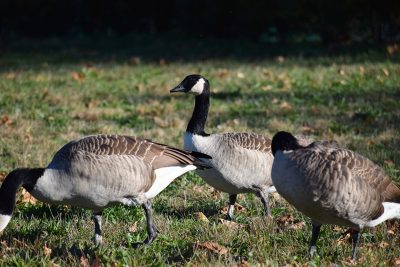
The Boston City Council met with the public Tuesday afternoon to discuss problems and potential solutions regarding the migration of Canada geese across the city.
Canada geese have been settling down in several Boston parks, fields and playgrounds, according to the committee’s hearing notice. City Councilor Mark Ciommo said the geese posed a public health issue due to the high amount of fecal matter they can produce.
Northeast District Manager of the Massachusetts Division of Fisheries and Wildlife Patricia Huckery began the hearing by listing possible solutions, including installing signs that would warn people not to feed the geese. She also suggested egg addling.
“Egg addling … is oiling the eggs with like a mineral or a corn oil, or the other effective technique is creating a pinhole in the shell,” Huckery said during the hearing.
Geese lay an average of seven to eight eggs a year, and destroying their nests would only create more work for people trying to decrease their population, as they rebuild quickly, according to Jennifer McNeil, a staff sergeant in the Park Rangers division of the Parks and Recreation Department.
Several councilors discussed using border collies as a way to harass and intimidate the geese, making them flee the area. However, Chris Cook, the commissioner of the Parks and Recreation Department, said this proposal would require more funds than the city can provide.
“Currently Boston Parks have no resources to allocate towards a border collie program or employing dogs to control this issue,” Cook said during the hearing.
If implemented, the border collie program could be costly, according to Tani Marinovich, the executive director of The Esplanade Association. Her organization has been using the program since 2007.
“We spend $24,000 a year on chasing the geese with the border collies,” Marinovich said. “They come three times a day, Monday through Sunday, and they come at different times.”
City Councilor Annissa Essaibi-George and Cook both suggested a partnership between private entities, such as golf courses and universities, and the city.
The city can coordinate with private interests to address the reduction of the goose population, as well as engage with Boston students and help them develop programs, according to Cook.
Essaibi-George said the city can partner with schools that have veterinary or environmental science programs, allowing those students to participate in the efforts to control the geese populations in Boston’s parks.
Joan Sweeney, 58, of Dedham, and the founder of Goosebusters, a local organization that handles the geese at the Boston Public Garden, attended the hearing to share her ideas for addressing the goose problem in Boston.
Sweeney said the border collie program is not the most ideal way to handle the geese.
“The use of the dogs is a kind of not-in-my-backyard solution. It just moves them someplace else,” Sweeney said after the hearing. “You hope they move some place where it doesn’t matter, but you can’t guarantee that.”
Luz Lopez, of Fenway, expressed her concern for the geese when she addressed the councilors during the meeting, saying she has advocated for the protection of geese for two years.
“We as a society should learn to share this earth with animals. They have rights too.” Lopez said. “It is out of arrogance that we want the land only for us to enjoy. Animals are, in this case, seen like nuisances, pests, and we demonize them unfairly.”
Huckery said she is pleased with the work the City of Boston is doing to handle the problem of Canada geese in the city.
“I’m amazed at how much work is already currently being done,” Huckery said after the hearing. “I absolutely think you should figure out how to live with Canada geese. However, when they reach nuisance levels there are options to help make it less of a problem.”


















































































































